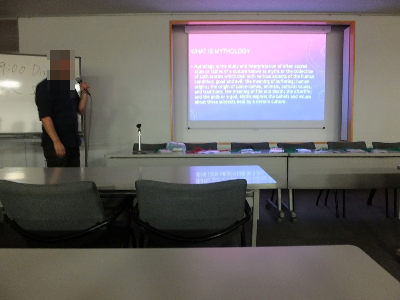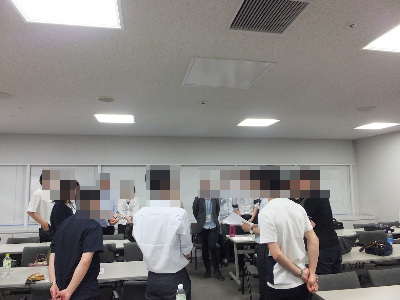

:::::::::::::::::::::::::::::::::::::::::::::::::::::::::::::::::::::::::::::::::
《 今回のworkshop 》
○workshop参加人数:45名(うち新人の方:3名)
○【前半】:Changes in the Content Industry
○【後半】:Mythology
:::::::::::::::::::::::::::::::::::::::::::::::::::::::::::::::::::::::::::::::::
【前半】
Title:
Changes in the Content Industry
Introduction:
“the content industry”: Companies owing and providing mass media. This includes music, movies, news, text publication of any kind, ownership of standards, geographic data, etc.
Our daily lives are now surrounded by a lot of content business, such as video, music, media, publishing, game, etc. Especially, the first two categories have been growing rapidly in the past decade. In April 2019, Netflix announced the number of their subscribers was 148 million in the world and Spotify1said their paying subscribers reached 100 million. Although there are many companies competing each other in the content business, a couple of newcomers are preparing to launch their services in the near future. For example, Apple is planning to start “Apple TV+”in Japan in fall 20192. Disney also announced that their new streaming service called “Disney+”is going to be unveiled later this year. Billboard3said Amazon is now preparing to launch a new music service for smart speakers (This is not officially announced by Amazon). More changes in the video and music industry are going to happen because we are welcoming the age of 5G4. Suppose you are watching a live streaming service with 5G network, you can enjoy it with higher resolution, with no delay, and you do not have to worry about the amount of data usage any more. Getting over these constraints will bring dramatic changes to the industry.
In this workshop, I would like you to have a better understanding of the current situation in the content business and think about the future perspective of the industry.
Note that there is a reference material in the PDF format attached to the E-mail.
[Notes]
*1Spotify has the most paying subscribers of all music streaming services. It has 217 million active users in total (April 2019)
*2Apple is going to launch Apple News+ and Apple Arcade (game streaming) around the same time.
*3 Billboard is the world’s most influential music media brand, famous for Billboard Hot 100 Chart and Billboard Magazine.
*4 5G (short for 5th Generation) is an advanced wireless system which will have a huge impact on the Internet society when it’s commonly used. Only 5 companies in the world offers 5G network system: Huawei, ZTE, Nokia, Samsung, and Ericsson. If you would like to know more about what 5G is, you can click the link below and watch a YouTube video (NOT compulsory).
https://www.youtube.com/watch?v=MC_Sfkh5-zQ
(“How 5G will change your smartphone, and your life in 2019”)
Discussion Questions:
Q1.(Introductory Question)
What kind of content services (any category) do you regularly use?
See the reference material 1 as a hint when it’s difficult to come up with ideas.
Q2. From the data on the reference material 2, what can you say about the global trend and the characteristics of Japanese market in music industry?
Q3. Many people subscribe to Netflix, Amazon Prime Video, or Hulu. One of the reasons is obviously because they can choose what they watch from a lot of options anytime and anywhere. What other aspects make these services so popular?
Q4. With the advent of 5G network, the production of video content is likely to change dramatically. What kind of changes or improvements do you expect?
Q5. Some people say that text content will regain popularity after the golden age of video content business with 5G. Do you agree with this opinion? If so, what kind of people will prefer text content? If not, explain the reasons why you don’t agree.
Q6. Prepare to share your group’s answer of Q5 with your neighbor. (from 7:00pm)
【後半】
Title:
Mythology
Discussion Questions:
0.Introductory Question:
Please introduce your favorite fairy tale or folk tale to your table members. And please share your interpretation of the meaning of that tale.
1.What does god’s relationship with humanity reveal about the connection between humans and everything else in the universe? (*1)
2.What purpose does god’s encounter with humanity serve in mythology? (*2)
3.What does any historical mythology reveal about the gods’ sense of justice? (*3)
3.What lessons are present in mythology that humanity can learn from it?
4.What does god’s revelations tell us about the nature of life and death? (*4)
5.Why does humanity struggle once our stories have left us, hence our ancestry?
Reference:
https://youtu.be/iRCVcuA6yZQ
Mythology (the stories-of-the-people) is the study and interpretation of often sacred tales or fables of a culture known as myths or the collection of such stories which deal with various aspects of the human condition: good and evil; the meaning of suffering; human origins; the origin of place-names, animals, cultural values, and traditions; the meaning of life and death; the afterlife; and the gods or a god. Myths express the beliefs and values about these subjects held by a certain culture.
Myths tell the stories of ancestors and the origin of humans and the world, the gods, supernatural beings (satyrs, nymphs, mermaids) and heroes with super-human, usually god-given, powers (as in the example of Hercules or Zeus). Myths also describe origins or nuances of long-held customs or explain natural events such as the sunrise and sunset, the cycle of the moon and the seasons, or thunder and lightning storms.
Mythology has played an integral part in every civilization throughout the world. Pre-historic cave paintings, etchings in stone, tombs, and monuments all suggest that, long before human beings set down their myths in words, they had already developed a belief structure corresponding to the definition of `myth’. According to psychiatrists, myths are a necessary aspect of the human psyche which needs to find meaning and order in a world which often presents itself as chaotic and meaningless.
Essentially myths can be grouped into three categories:
Etiological Myths / Historical Myths / Psychological Myths
Etiological myths explain why a certain thing is the way it is or how it came to be. For example, in Egyptian mythology the sycamore tree looks the way it does because it is home to the goddess Hathor, the Lady of the Sycamore. Etiological myths can offer explanations for why the world is the way it is – as in the story from Greek mythology of Pandora’s Box which explains how evil and suffering was released into the world – or how a certain institution came to be – as in the Chinese myth of the goddess Nuwa who kept creating human beings over and over and over until she grew tired and instituted the practice of marriage so humans could reproduce themselves.
Historical myths retell an event from the past but elevate it with greater meaning than the actual event (if it even happened). One example of this is the story of the Battle of Kurukshetra as described in the Indian epic Mahabharata in which the Pandava brothers symbolize different values and provide role models, even if they are occasionally flawed. Kurukshetra is then presented in microcosm in the Bhagavad Gita where one of the Pandavas, Arjuna, is visited on the battlefield by the god Krishna, avatar of Vishnu, to explain one’s purpose in life. Whether the Battle of Kurukshetra ever took place is immaterial to the power of these two stories on a mythological level. The same can be said for the Siege of Troy and its fall as described in Homer’s Iliad or Odysseus’ journey home in the Odyssey or Aeneas’ adventures in the work of Virgil.
Psychological myths present one with a journey from the known to the unknown which, represents a psychological need to balance the external world with one’s internal consciousness of it. However that may be, the story of the myth itself usually involves a hero or heroine on a journey in which they discover their true identity or fate and, in so doing, resolve a crisis while also providing an audience with some important cultural value. Probably the best-known myth of this type is that of Oedipus the prince who, seeking to avoid the prediction that he would grow up to kill his father, leaves his life behind to travel to another region where he unknowingly winds up killing the man who was his actual father who had abandoned him at birth in an attempt to circumvent that same prediction.
Every culture in the world has had, and still has, some type of mythology. The classical mythology of the ancient Greeks and Romans is the most familiar to people in the west but the motifs found in those stories are echoed in others around the world. The Greek tale of Prometheus the fire-bringer and teacher of humanity is echoed in the Chinese tale of Fuxi. The story of Nuwa and her creation of human beings in China resonates with another from the other side of the world: the story of creation from the Popol-Vuh of the Maya in which humans are created who can do nothing and prove useless but, in the Maya story, are destroyed and the gods then try again. This same motif appears in the mythology of Mesopotamia where the gods struggle in creating humans who keep coming out poorly.
Mythology tries to answer the most difficult and the most basic questions of human existence: Who am I? Where did I come from? Why am I here? Where am I going? To the ancients, the meaning of the story was most important, not the literal truth of the details of a certain version of a tale. There are many variations on the birth and life of the goddess Hathor of Egypt, for example, and no ancient Egyptian would have rejected one of these as ‘false’ and chosen another as ‘true’. The message of the myth contained the truth, not the specific details of the story, which is evident in the genre known as Mesopotamian Naru Literature in which historical figures are featured out of their historical context.
It was understood in the ancient world that the purpose of a myth was to provide the hearer with a truth which the audience then interpreted for themselves within the value system of their culture. Apprehension of reality was left up to the interpretation of the individual encountering the values expressed in the myths instead of having that reality interpreted for them by an authority figure.
This remains the essential difference between a sermon and an individual experience with religious mythology; within one’s cultural belief system a sermon can only encourage or reinforce common belief while a myth, though it might do the same, has the potential to elevate and transform individual understanding through the potency of symbolic landscape, character, image, and theme. The ancient myths still resonate with a modern audience precisely because the ancient writers crafted them toward individual interpretation, leaving each person who heard the story to recognize the meaning in the tale for themselves and respond to it accordingly.
補足説明
(1)人類が抱いてきた共通の疑問の一つが「人間と世界」との関係ですが、多くのMythologyにおいてその疑問は神と人間との関係から説明されています。何らかのMythologyを例に挙げて、そのMythologyではどのような説明がなされているか、ということを議論してください。
(2)Mythologyにおいて神を登場させ、人間と遭遇させるのは何らかの目的があっての描写であると考えられます。その描写の目的が何であるかについて議論してください。
(3)この設問を議論するにあたっては、『モーセの十戒』が参考にしやすいかと思います。
モーセの十戒 – Wikipedia https://ja.wikipedia.org/wiki/%E3%83%A2%E3%83%BC%E3%82%BB%E3%81%AE%E5%8D%81%E6%88%92 (4)”god’s revelations”は「天啓」という意味ですが、これにこだわらずMythologyにおいて生と死がどのように描かれているかを議論していただいてもかまいません